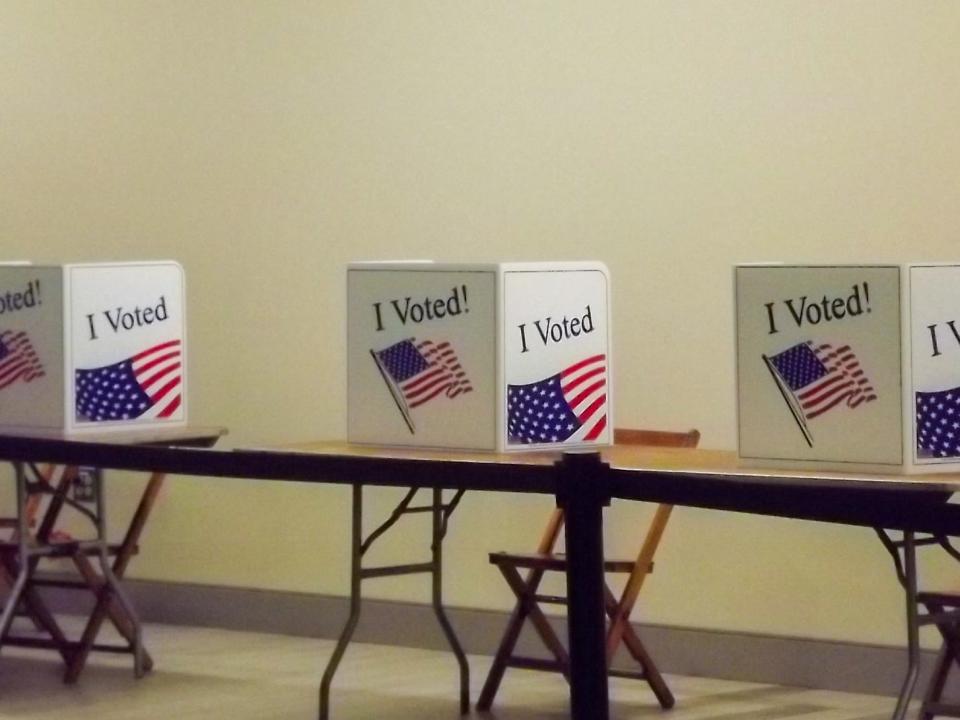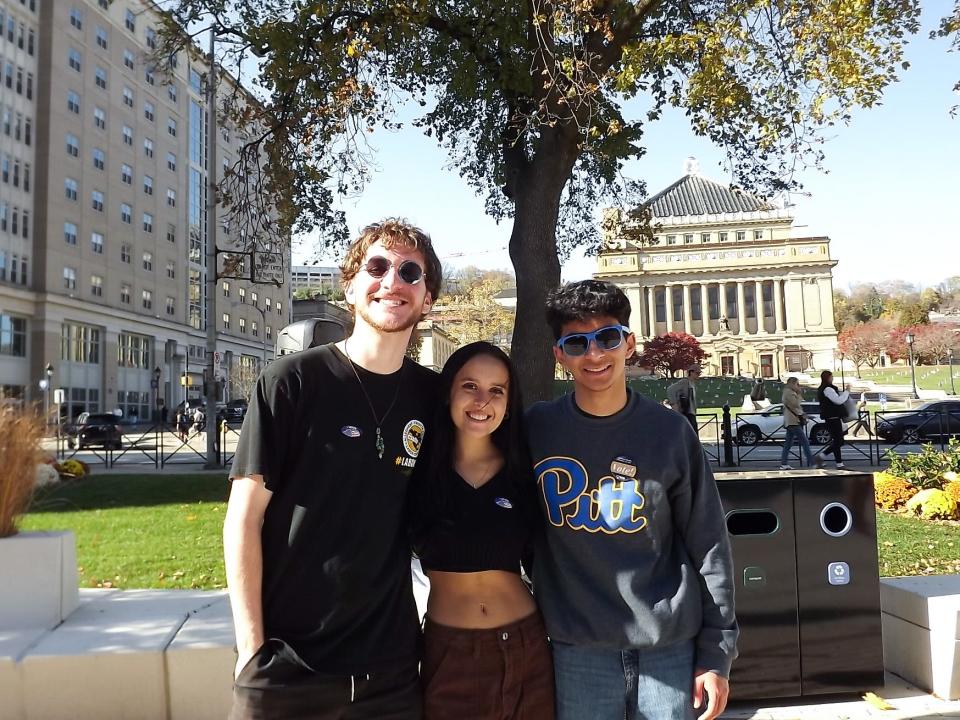With abortion access, student loans, book bans and more on their minds, young voters took to the polls on Election Day
For some young voters in Allegheny County, local elections are just as important as national ones – and perhaps even more important.
Rafay Khan-Afridi believes having a “livable environment” was among the main issues that young voters could have had an impact on through Tuesday’s election.
“When it comes to things like rent … waste management … the quality of the public entertainment and options we have in Oakland, all these different issues play into having a neighborhood that's livable,” Khan-Afridi, a sophomore political science and economics major at the University of Pittsburgh, said. “That's something that is very directly affected by municipal elections by people who are in charge of the county, the County Council and county exec.”

Pennsylvania’s youth turnout rate for the 2022 midterm was 31.7% — the sixth highest in the nation, according to CIRCLE. With Gen Z voters overwhelmingly boosting Democratic candidates, according to the Pew Research Center, they might have played a vital role in this year's Allegheny County election.
Headlining this year's election was a rematch between Democrat Matt Dugan and Republican Stephen Zappala for district attorney. Dugan ousted Zappala, a lifelong Democrat, in the Democratic primary, prompting the career politician to run as a Republican instead. But Zappala ultimately won back the seat in unofficial results.
Also at the forefront was the race between Democrat Sara Innamorato and Republican Joe Rockey to replace outgoing County Executive Rich Fitzgerald. Innamorato ultimately prevailed.
Voters also went to the polls to elect a new justice of the Supreme Court of Pennsylvania and voters in many of the county’s municipalities cast ballots for mayors, council members and commissioners.
“When it comes to young voters there’s a lot we want to see and I think it translates into a general frustration with the lack of change,” Khan-Afridi said, noting that some of the candidates fall short in representing young voters.
Although he wasn’t passionate about many of the candidates on his ballot, Khan-Afridi said he felt it was still important to vote.
“I voted more along the principle of harm reduction as opposed to being super passionate about any of the candidates,” Khan-Afridi said. “A lot of the candidates running on both sides were representative of what’s currently already [represented] in the system rather than something new or refreshing.”
Grace Kozak, a first-year funeral studies major at Point Park University, voted using a mail-in ballot as she found it challenging to change her address from central Pennsylvania to Pittsburgh. She said her focus this election cycle was on the school board race in her hometown and the magisterial judge race in her district.
For the school board race in particular, Kozak said book banning was the main issue that informed her vote. The conversation around book bannings and censorship has remained at the forefront of many school board meetings and has been a contentious voter issue for many parents and students this election.
“We're trying to get some books unbanned just because I think it's very important for everybody to have access to literature that they want to read, and literature that they can make informed decisions about,” Kozak said. “It's not for a certain group or a party to decide. It should be up to that person to decide what they want to read.”
She added that local elections are especially important as they allow people to have a say in the political and government decisions that affect them on a day-to-day basis.
For some students at the University of Pittsburgh, the Allegheny County Council’s 10th District race was a standout as longtime activist Carl Redwood was on the ballot. Matt Jurich, a sophomore political science and philosophy major at Pitt, said there aren't many candidates who go against the grain of the two-party system, which is why Redwood’s independent candidacy and empathy-led policies resonated with him.

“I think that [Redwood] represents what people in Pittsburgh really want to see get done and not just people who have been in the same position for like 30 years, so there's been some good energy around Carl on campus,” Jurich said.
Minimum wages, taxes, student loan debt and health costs are especially important issues for Jurich, who said young voters are “desperate for some kind of change outside of the current system.”
“A lot of things were promised to our generation in previous elections and people have not followed through on them at all,” Jurich said.
Although Khan-Afridi is not in the 10th District, he said he found Redwood’s candidacy interesting. He said Redwood’s vocal support for Palestinians during the recent escalation of violence in Gaza and Israel was especially important as it reflects what many young voters care about.
“He has a lot of views that aren’t necessarily as popular among politicians but are super, super popular among voters, which is why I’m so passionate to see somebody like him run for election,” Khan-Afridi said.
Tuesday’s election was the first where Grace Cuevas voted in Pittsburgh. Cuevas, a sophomore political science and philosophy major at Pitt, said she was excited to research each candidate and make a change in the community. Redwood was also one of the main candidates she was interested in as she felt he could make a “tangible change” in local government.
With rising rent prices and poor housing conditions, Cuevas said Pitt students tend to express their frustration with life in Oakland. Despite this shared sentiment, Cuevas added that she thinks too many students don’t see the value of voting in local elections.
“It's really important for students to understand that there is a way for us to have a voice and for us to have representation that will allow us to feel safer and more comfortable and happier living in Oakland,” Cuevas said. “So I think that it's really important for students to [understand] the issues that are presented in these local elections and [vote] for people that they think can make a change for them.”
On Point Park’s campus, the lack of attention to local elections was also on younger voters’ minds.
Madison Kline, a junior child psychology major at Point Park, said younger people typically don’t tend to care as much about local elections as they do presidential elections, even though in some cases local elections are even more important. Kline made a plan to vote later in the day at her polling place in Homestead and shared that abortion rights and safety in schools would go into her voting decisions.
“I feel like a lot of young people don't follow local elections, since it's not as big as a presidential election or the governor's race,” Kline said. “They aren’t as informed and I feel like a lot of people don't even know that it’s election day.”
Carnegie Mellon University suspended all classes until 5 p.m. for its inaugural Democracy Day, which aims to encourage young voter turnout, according to the school’s website. Pitt, Chatham University and Point Park still held classes, meaning students had to find time within their schedules to vote if they hadn’t already sent in a mail-in ballot.
Andrew Salzman, a sophomore business administration major at CMU, described himself as fiscally conservative but socially liberal and said he typically votes with a split ballot. Originally from Southern California but voting in Pittsburgh, Salzman questioned whether college students should be allowed to vote in local elections because, in his view, they often don’t take time to learn about the candidates.
“A lot of the time they're not really engaged in local politics,” Salzman said. “It doesn't really affect them because they're only here for four years and like they're kind of just voting for the party they usually agree with without even reading up on anyone or the positions.”
Anabella Arziate, a first-year information systems major at CMU, said she voted for Dugan and Innamorato, though she couldn’t recall the rest of her ballot. Still, she said every selection she made was blue.
Arziate said unlike left-leaning Hawaii, where she’s from, Pennsylvania can veer to both sides of the political aisle. With that in mind, she’s excited that the first vote she cast was in a battleground state.
“In Hawaii, I'm just adding more to the pile, and then here, the pile size actually matters,” Arziate said.
Like Arziate, Jackson Adkins, a junior management information systems major at Chatham and the executive president of the student government, came out ready to vote Democratic. He said as he was about to enter a polling place on Chatham’s campus, the issues of abortion access and gun control were at the top of his mind.
Adkins said following a 2016 shooting at his father's law office in St. Paul, Minn., that left one person dead, he wants to see whomever he votes for make sure Pennsylvania implements rigid gun regulation laws.
“I think guns are very dangerous, and I think that the more guns we have in circulation, the more dangerous our society becomes,” Adkins said.
Bennett Spencer, a junior interior design major at Chatham, voted using a mail-in ballot and said she had a particular interest in the Pennsylvania Supreme Court race. She said she voted for candidate Dan McCaffery mainly because of his staunch support of abortion rights.
Spencer said in her three years at Chatham she’s seen voter turnout increase drastically, with most of the votes cast leaning blue. She said she hopes this will turn the political tide away from older politicians and replace them with fresher faces.
“We want to keep our rights, and I think we also want change,” Spencer said. “Lots of the government leaders are pretty old and I think they don't think as far ahead as we're thinking because we're going to have to deal with the repercussions of all the stuff going on right now.”
Beyond just voting in every election, Khan-Afridi encouraged other young voters to do their research on candidates and get involved in politics year-round to advocate for what they care about.
“Go vote and do more than that,” he said. “Get passionate about the issues and try and make a change.”
Betul Tuncer and James Paul are students at the University of Pittsburgh serving as Pittsburgh Media Partnership interns this semester. James Paul can be reached at pjames@pointpark.edu. Betul Tuncer can be reached at betulstuncer@gmail.com.
This article originally appeared on Beaver County Times: What role can young voters play in elections?

